About Us
Members Enjoy 10% Off Storewide – Sign In to Save Instantly!




Nov 2024
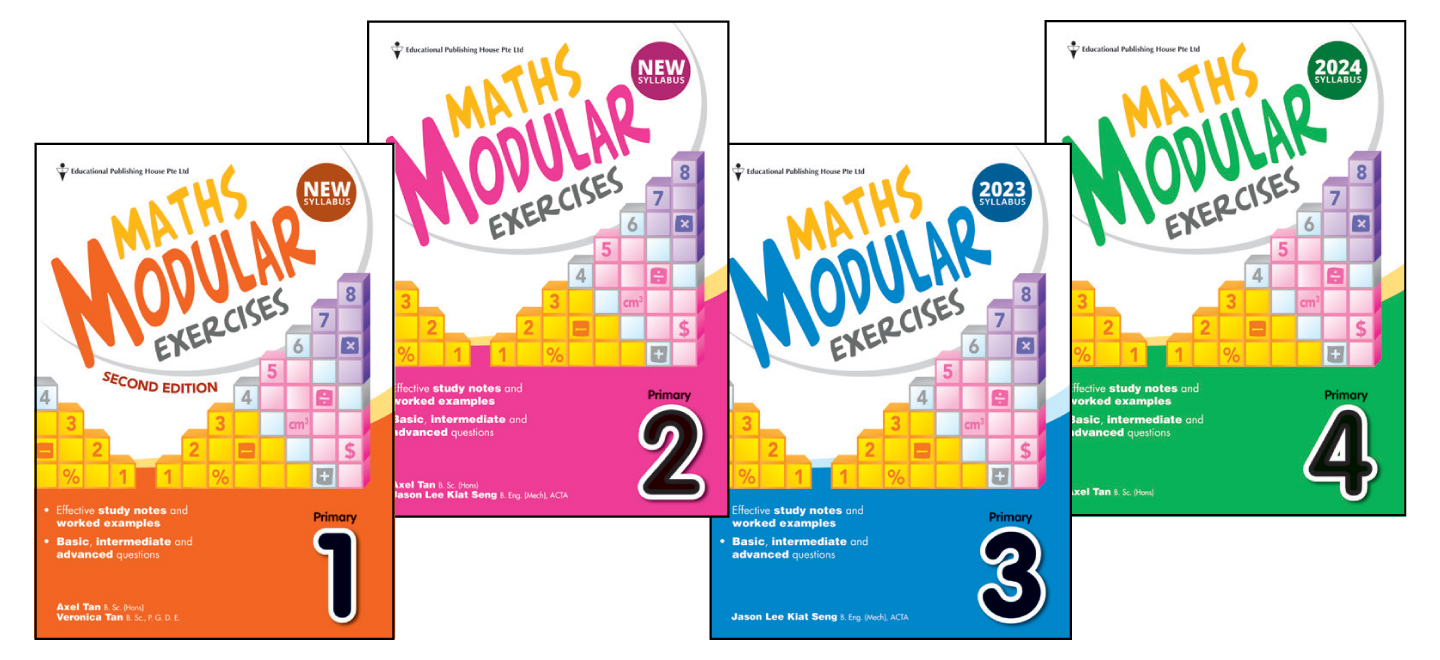
Here’s how pupils can develop essential maths skills effectively.
Nov 2024 | By EPH Editorial Team
It is not unusual for pupils to find maths difficult, as maths concepts often involve abstract ideas and symbols that can be tricky to digest. To master these concepts, pupils need to develop relevant maths skills through a good balance of understanding, practice, and application. Here are some recommendations on how to do so.
Master the Basics
Maths often builds on prior knowledge. The basics are the building blocks for more advanced concepts. If pupils have difficulties understanding the basics, it can be challenging for them to take on more advanced concepts. Instead of jumping ahead, a step-by-step approach from the basics helps pupils develop essential maths skills at every learning stage for a more holistic learning experience.
Understand the Concepts
Memorising maths formulae without understanding the logic behind them results in surface learning. To effectively develop maths skills, pupils should understand the ‘why’ behind the concepts, not just the ‘how’. This will enhance their comprehension and make it easier to develop other related or more advanced maths skills.
Relate to Real Life
We can make maths more relevant and engaging for pupils by relating it to real-life situations. For example, we can relate geometry to design or ratio to cooking. Such an approach helps pupils appreciate the relevance of maths in daily life and can motivate them to develop related maths skills based on their interests and hobbies through self-directed learning.
Join Study Groups
Study groups provide a stimulating learning environment to hone maths skills. In a study group, pupils can work on higher-level questions together and explain their thought processes to derive the answers. This not only helps to reinforce understanding but also allows pupils to pick up different answering techniques and approaches to problem solving from their peers. Studying together can also make learning more enjoyable.
Practise Regularly
A simple yet effective way to develop maths skills is consistent practice. Pupils should attempt a variety of practice questions regularly to apply their knowledge, train their problem-solving skills, and reinforce their understanding. Besides textbooks, pupils can also tap on guidebooks that provide explanations, examples, and exercises.
Maths Modular Exercises ($16.90 each) by Educational Publishing House is a series of complete companions to Primary Maths courses written in accordance with the latest Ministry of Education syllabus. Each book in the series consists of notes, worked examples, drilling questions, multiple-choice questions, short-answer questions, structured or long-answer questions, and revision papers.
Aug 2024
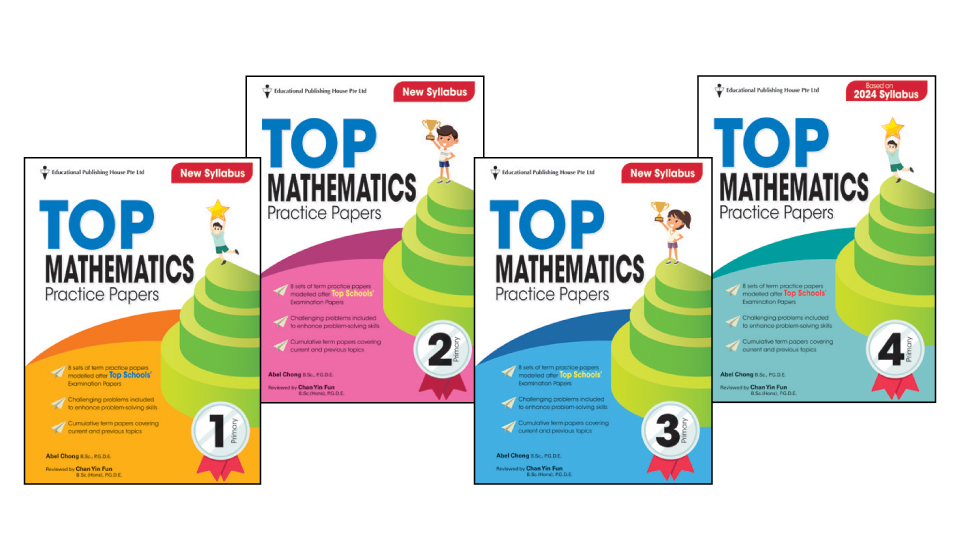
Instilling effective study habits in your routine is key to scoring AL1 for mathematics.
Aug 2024 | By EPH Editorial Team
Scoring AL1 for mathematics is the ultimate goal for pupils, but preparing and sitting for the actual exam itself can be nervewracking. To work towards your goal, here are four tips to help.
1 Start Revision Early
Prepare for your exams early. Do not leave your revision until the day or night before, as you need to ensure you have ample time to cover all topics. Starting early will also help to alleviate the stress you may face as compared to doing last-minute revision. Before you start revising, create a study plan. As a general guide, it should include the number of hours to revise per week, the time allocated for each session, and a detailed schedule of all topics to revise. By sticking to a personalised study plan, you will be able to revise each topic systematically without feeling too rushed or disorganised.
2 Know Your Proficiency Level
To revise effectively, you first need an intimate understanding of your proficiency levels in various topics. Which topics are you stronger in? Are there any topics you’re unsure of and require more practice or guidance? Instead of trying to cram everything indiscriminately, plan your study sessions to address specific learning gaps and focus on relevant areas for improvement first. Only by making up for your shortcomings can you see a positive impact on your overall grade.
3 Avoid Common Mistakes
It is only human to err. When it comes to mathematics, you will inevitably find yourself making mistakes from time to time. What is important is that you understand what went wrong and how to rectify it so you get it right the next time. Compile the mistakes you usually make in your practice questions in a notebook and be sure to review them regularly so you do not make similar mistakes again.
4 Practise Regularly
As the saying goes, practice makes perfect. This is especially true if you wish to excel in mathematics. The most effective way to learn mathematics is by doing it, and if you commit to practising regularly, understanding new concepts and applying the right methods will then become more familiar and natural to you over time. Consistent practice will also help to improve your accuracy and speed in the exams.
Achieving AL1 in mathematics is not impossible. Apart from the tips above, reinforce your revision by practising relevant questions that are set according to the exam standard, such as from the TOP Mathematics Practice Papers series ($11.90 – $12.90) by Educational Publishing House. A six-book series written to prepare pupils for their school assessments and exams, each book comprises term practice papers which are pitched at a level of difficulty comparable to the standards of top primary schools in Singapore. Do also keep your eyes peeled for the upcoming updated releases of the other primary levels!
May 2024
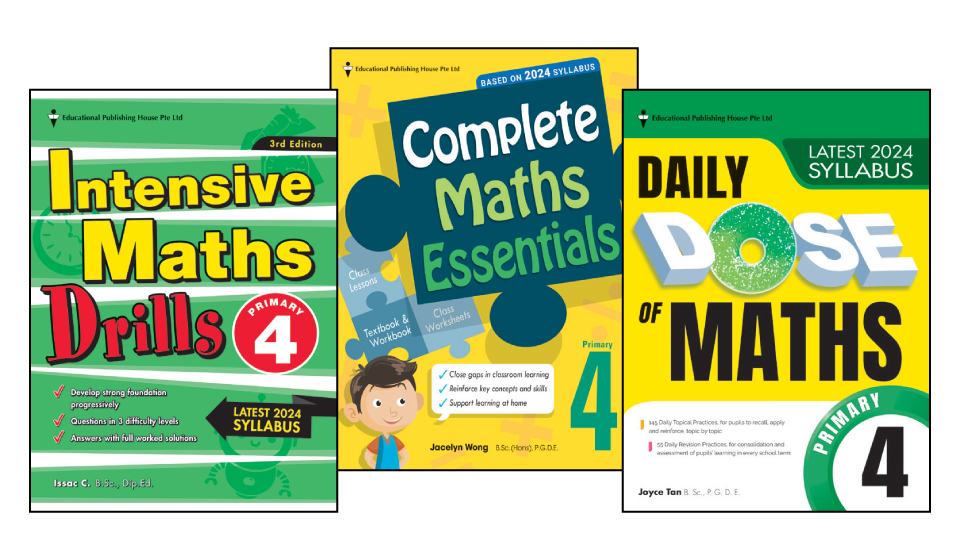
Are you up-to-date with the changes to the revised Primary 4 Maths syllabus from 2024?
May 2024 | By EPH Editorial Team
The Ministry of Education usually reviews subject syllabuses once every few years to refresh and maintain content relevance. This year, a new Primary 4 Maths syllabus is introduced. The table below provides a summary of the changes.

Removal of Topics
For the topic of Angles, turns and the 8-point compass have been taken out of the Primary 4 syllabus. However, take note that pupils are still required to learn angle notations, measurement of angles, and drawing of angles.
Another major change is that the topic of Time is no longer covered in Primary 4. It has been brought forward entirely to Primary 3 in 2023.
New Topics
The topic of Nets, previously covered in Primary 6, is now included in the new Primary 4 syllabus. Notably, pupils are also required to draw 2D representations of a cube, cuboid, prism, and pyramid.
Another topic that Primary 4 pupils are required to learn is Pie Charts, which also used to be covered in Primary 6. Pupils are now required to learn to read and interpret data from pie charts earlier.
In particular, the addition of the topics of Nets and Pie Charts, which were previously higher-level topics, might be a cause of concern for parents and pupils. That said, with a receptive learning attitude in class and conscientious effort in revision, pupils will be able to ease into the new syllabus positively. To boost learning efficacy, pupils can refer to Primary 4 Intensive Maths Drills ($12.90), Primary 4 Complete Maths Essentials ($12.90), and Primary 4 Daily Dose of Maths ($17.90) from Educational Publishing House. These supplementary resources have been revised according to the latest syllabus to help pupils adapt to the new syllabus changes.
Mar 2024
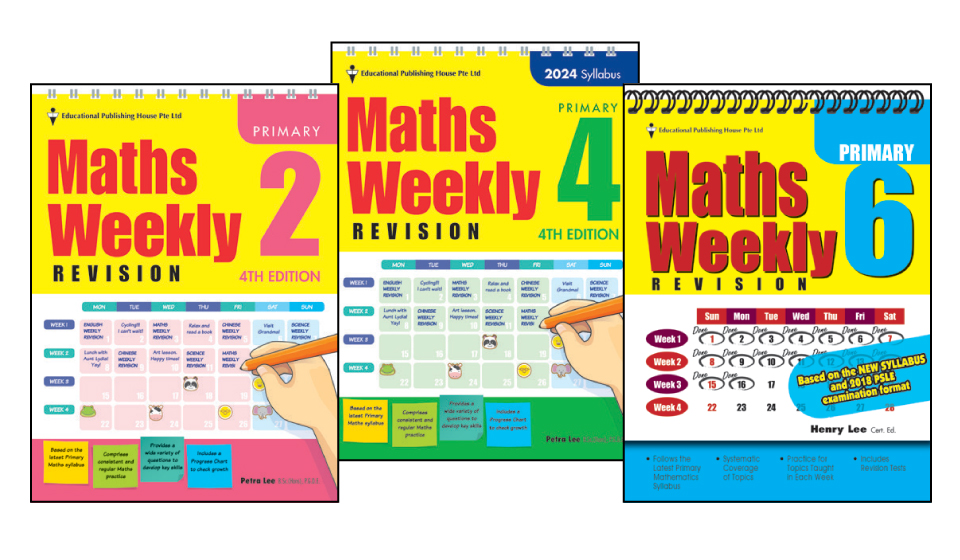
Author Petra Lee shares her thoughts on her bestselling assessment series, Maths Weekly Revision.
Mar 2024 | By EPH Editorial Team
Driven by her passion for shaping young minds, Petra Lee transitioned from real estate to teaching and was a former MOE Primary School teacher of nearly 20 years. Influenced greatly by her father’s teaching legacy, she advocates for the ethos of consistent practice and is dedicated to nurturing young learners. The EPH Editorial Team speaks with her to find out what went into the making of her bestselling series, Maths Weekly Revision ($11.50 – $11.90).
Q What motivated you to write this series?
The genesis of this series traces back to my late father, the visionary behind its inception. During his time spent teaching in a primary school, my father wanted to help his pupils achieve mastery of the mathematical concepts taught in school, regardless of their learning abilities. However, some pupils fell behind, thus he decided to devote time to revisit previously taught concepts and ensure his pupils were dutifully practising maths questions. Seeing the improvement made by many of his pupils over time, my father witnessed first-hand the importance of consistent practice. Inheriting my father’s steadfast belief in the power of consistent practice, I’ve carried forward his teachings into my own role as an educator. My father and I believed that an assessment series that embraced the values of discipline in consistent practice would serve as the building blocks towards success in maths. Thus, the Maths Weekly Revision series was born.
Q Where did you get the inspiration or ideas for this series?
The fundamental principle which guides us in writing this series is consistent practice as a catalyst for mastery in maths. We draw inspiration and ideas from our classrooms, and try to conceptualise what works for our pupils and put what was practised in class on paper. For instance, pupils who struggle with basic operations like multiplication inspired us to design creative and engaging multiplication booklets. Through consistent practice sessions, they were eventually able to master the multiplication tables while having fun learning.
Q Why is consistent practice important in maths?
Consistent practice allows pupils to solidify their understanding and achieve deeper mastery of concepts. It cultivates a deeper retention of knowledge and enables pupils to navigate complex mathematical problems with confidence.
Q How can this series help pupils excel in maths?
The Maths Weekly Revision series aids pupils in excelling in maths by providing structured and regular practice materials. Inspired by successful classroom strategies, it reinforces key concepts and encourages self-directed learning. This approach helps build a strong foundation, prepares pupils for assessments, and makes maths more engaging and enjoyable.
Nov 2023
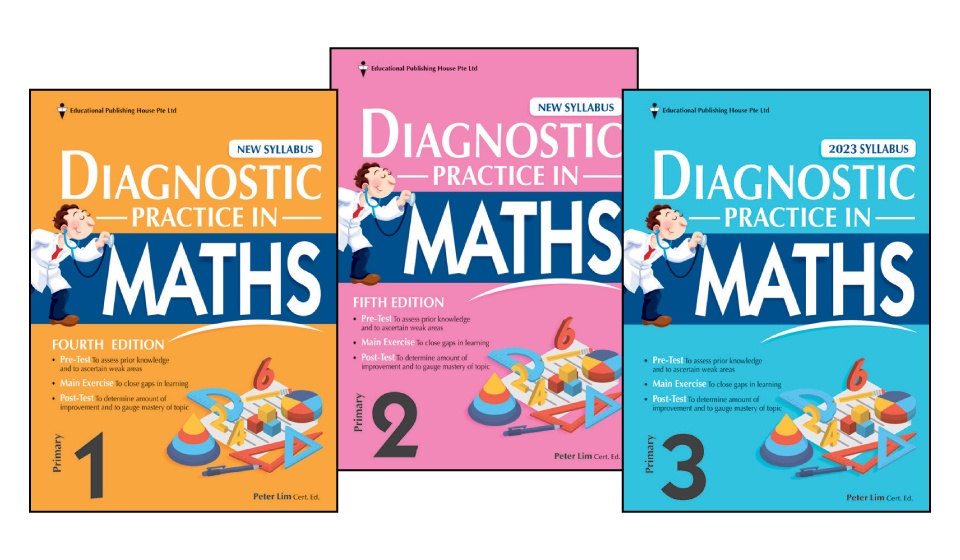
Here’s a handy evaluative tool to help gauge and track your child’s academic progress.
Nov 2023 | By EPH Editorial Team
Q What is diagnostic assessment?
Diagnostic assessment is a type of formative assessment designed to gather information about how pupils perform in a particular topic. Usually, a pre-evaluation is given at the start of a lesson and/or a post-evaluation is given at the end of it. The pre-evaluation allows pupils to discover how much prior knowledge they possess about the topic while the post-evaluation shows how much improvement they have made over the course of the lesson.
Q Why is diagnostic assessment important?
Diagnostic assessment is an essential tool to understand a pupil’s strengths and weaknesses. It is used to gauge pupils’ levels of knowledge and allow them to become aware of their own learning gaps. This is particularly important as pupils must be able to pinpoint and work on their areas of weakness early to avoid falling behind. In addition, diagnostic assessment also helps teachers and parents determine how best to address the specific learning needs of each child.
Q How does diagnostic assessment help your child in Primary Maths?
Diagnostic assessment is useful to identify specific maths topics, concepts, or application methods your child may face learning difficulties in. It can be administered at home or during maths lessons, and feedback can be given almost instantaneously so your child can learn from their mistakes straightaway. For upper primary pupils who can assess themselves, self-administered diagnostic assessment can encourage independent learning and motivate them in their revision as they strive to do better with every assessment. Furthermore, as diagnostic assessments are mostly informal and not used for formal grading purposes, your child can avoid the anxiety of formal assessments and enjoy a positive learning experience at the same time. To evaluate your child’s understanding and application of mathematical concepts, refer to P1 – P3 Diagnostic Practice in Maths ($12.90 each) by Educational Publishing House. This series consists of a pre-test, a main exercise, and a post-test for each topic to fulfil the learning needs of your child at their own pace.
Customer Care
Retail Stores
Corporate Sales
About Us
Customer Care
Retail Stores
Members
Corporate Sales
Gift Voucher

© Copyright 2025 Popular Book Company Pte Ltd .197500612M All Rights Reserved.

